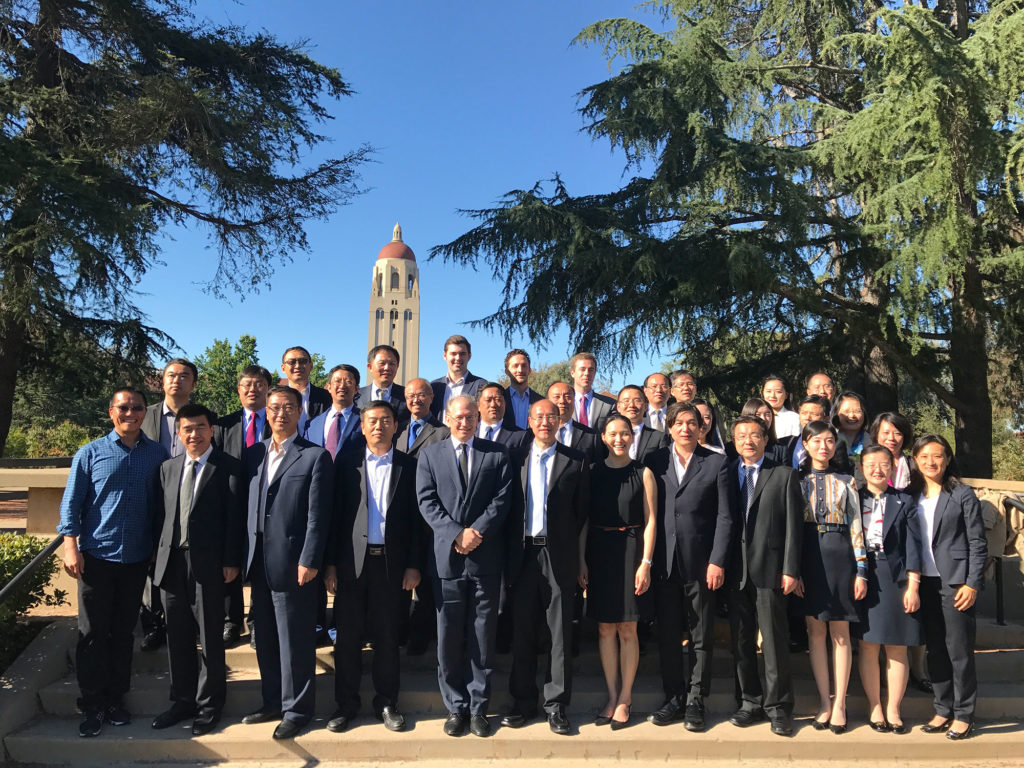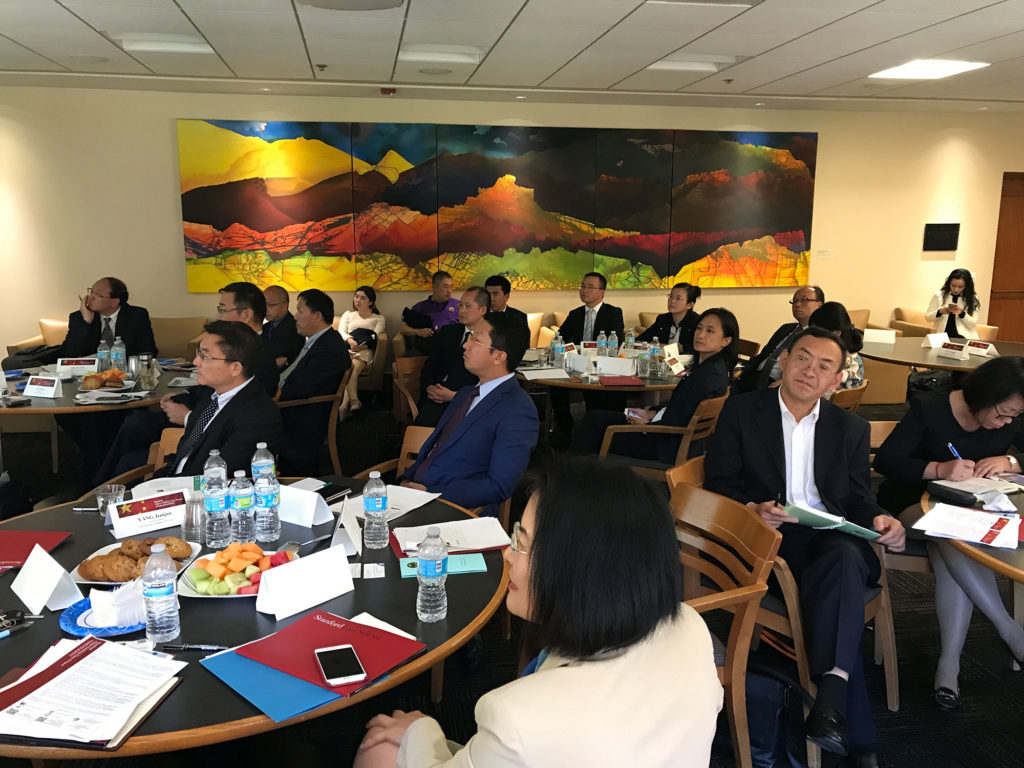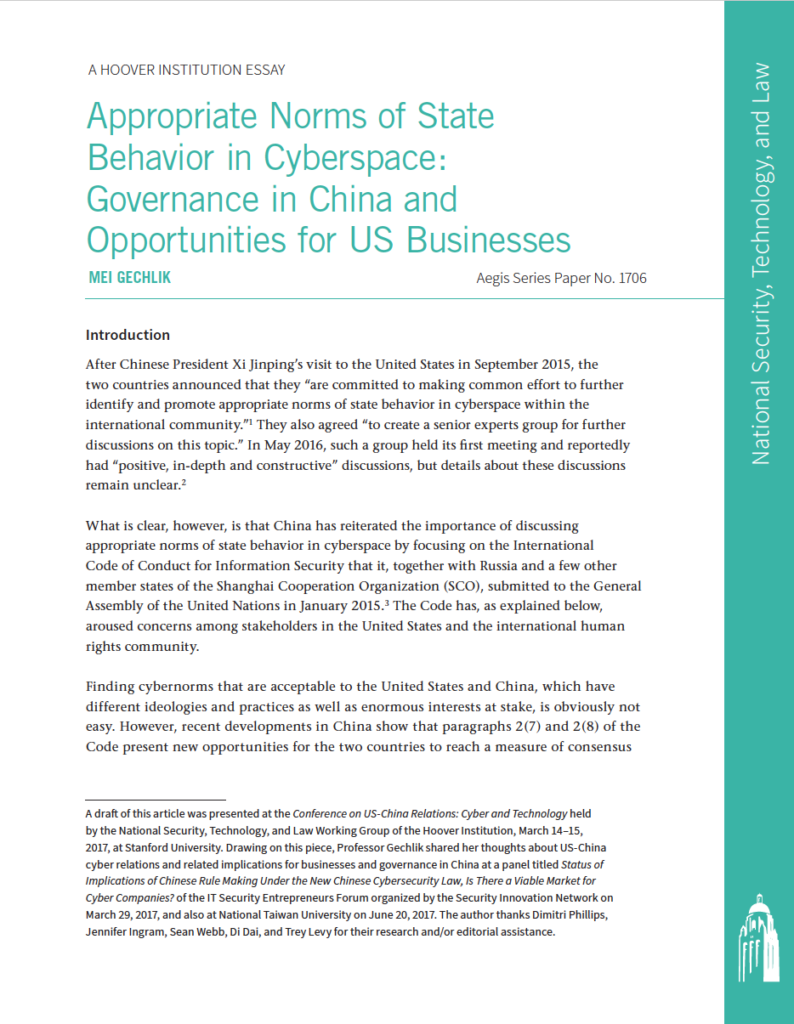Training China Law Society Delegates on Guiding Cases and Belt & Road Initiative; Ten New B&R Cases; Hoover Paper on US-China Cyber Relations; Writing Contest (Great Progress)

Training China Law Society Delegates on Guiding Cases and Belt & Road Initiative

This summer turned out to be another productive season for the China Guiding Cases Project (“CGCP”). Following a talk at the American Chamber of Commerce in Beijing (“AmCham”) and a visit to the Tongzhou District People’s Court in June, the CGCP organized, in collaboration with the International Law Institute, a seminar on China’s Guiding Cases and U.S. Precedents on July 31 at Stanford Law School.
The event was part of a training program on judicial responsibility systems organized for 22 distinguished delegates from China Law Society. The seminar featured presentations by Dr. Mei Gechlik, founder and director of the CGCP, and Mr. Peter Su, a partner in the Palo Alto office of Dentons U.S. LLP who specializes in cross-border litigation, corporation transactions, and intellectual property. The respective talks they presented were “China’s Guiding Cases and Their Importance to the Belt and Road Initiative” and “Significance of China Cases in Cross-Border Disputes in U.S. Litigation”. Other participants included Ms. LIN Jie, (Advisor to the CGCP; Chairperson and Head of Government Relations at Akamai Technologies), Ms. Helen Su (Advisor to the CGCP; Partner at Alston & Bird LLP), Mr. Qianwu Yang (Senior Partner at Dentons Law Firm (Shenzhen)), and several CGCP members.
The CGCP thanks Mr. Robert Sargin (Deputy Director of the International Law Institute) and Mr. WANG Wei (Head of the Chinese delegation and Deputy Director-General of the China Legal Exchange Center of the China Law Society) for bringing us this opportunity and helping us make this event a great success. For the English and Chinese event summaries and a complete list of the Chinese delegates (in the Appendix of the summaries), please visit https://cgc.law.stanford.edu/event/guiding-cases-seminar-20170731.
Ten New B&R Cases
In her talk titled “China’s Guiding Cases and Their Importance to the Belt and Road Initiative” mentioned above, Dr. Gechlik explained the rapid development of the Belt and Road Initiative (“BRI”) since the idea was introduced by China’s President Xi Jinping in 2013. In an attempt to address concerns about legal risks arising from BRI projects, the Supreme People’s Court (“SPC”) has released 18 “Typical Cases” (“TCs”) related to the initiative: eight in 2015 and another ten in May 2017; the CGCP publishes these as B&R CasesTM. As these TCs show sensitive and sensible treatment by Chinese judges of cases with wide-reaching and international importance, Dr. Gechlik suggested that at least some of them be re-issued as GCs so that they might benefit from additional exposition by the SPC and be invested with de facto binding force.
Hoover Paper on US-China Cyber Relations

June 2017 saw significant but little noticed developments in the Shanghai Cooperation Organization (“SCO”) and China. In that month, India and Pakistan became SCO member states. Covering three-fifths of Eurasia and representing nearly half the world’s population, the SCO has, therefore, amassed enormous clout to achieve its goals. At the same time, China took over the rotating chair of the SCO and is now scheduled to host the next annual summit of the organization in June 2018. In the coming year, China will likely garner more support for its agenda, including the International Code of Conduct for Information Security that China and other member states of the SCO submitted to the General Assembly of the United Nations in 2015.
In her essay titled “Appropriate Norms of State Behavior in Cyberspace”: Governance in China and Opportunities for U.S. Businesses published by Hoover Institution, Dr. Gechlik observes:
Finding cybernorms that are acceptable to the United States and China, which have different ideologies and practices as well as enormous interests at stake, is challenging. However, recent developments in China show that the International Code of Conduct for Information Security […], especially Paragraphs 2(7) (protecting online and offline rights equally) and 2(8) (facilitating access for all in cyberspace), present new opportunities for the two countries to bridge certain gaps in setting cybernorms.
In the essay, she identifies these developments in China⎯the new Guiding Cases System as well as foreign and domestic developments regarding facilitating everyone’s access to cyberspace⎯and discusses how they, together with the SCO’s growing significance in the international arena, call for more strategic thinking among U.S. policymakers so that the United States can seize the new opportunities to engage meaningfully with China in establishing international norms for cyberspace.
The English version of the essay is available at http://www.hoover.org/research/appropriate-norms-state-behavior-cyberspace-governance-china-and-opportunities-us; the CGCP thanks the Hoover Institution for allowing us to publish the Chinese version of this essay on the CGCP website here.
Writing Contest (Deadline: Sept. 30, 2017): Many Submissions Received
In May 2017, we launched an international Writing Contest to encourage more analyses of cases in China because of their growing importance. We have received many submissions and look forward to receiving more before the September 30, 2017 deadline. For more information about the Writing Contest, please visit https://cgc.law.stanford.edu/event/china-cases-insights-writing-contest-2017.
For published China Cases InsightsTM, please see China Cases Insight No. 1: “In Qihu v. Tencent, the Chinese Supreme People’s Court Offers Antitrust Insight for the Digital Age” by the Honorable John M. Walker, Jr. (Senior Circuit Judge, U.S. Court of Appeals for the Second Circuit) (link) and China Cases Insight No. 2: “Guiding Case No. 70: Food and Chinese Medicine” by Dr. Gechlik and Zhaoyi (Troy) Song (Assistant Managing Editor, CGCP).
The CGCP thanks our sponsors, including Alston & Bird LLP, Broad & Bright, the Center for East Asian Studies of Stanford University, China Fund of the Freeman Spogli Institute for International Studies of Stanford University, and the Fu Tak Iam Foundation Limited, for their kind and generous support. The CGCP strives to continue bringing you more insights about China’s Guiding Cases. Please help us achieve this goal by making a gift to us today and become part of our historic mission to help China develop its case law system. Thank you for your support!
Post Pagination
- Previous Article U.S.-China “Dialogues” on Guiding Cases; China Cases Insights and Writing Contest; Collaboration with Ravel
- Next Article RSVP NOW for Seminar on China’s IP Case System Featuring Beijing IP Court Judges; Successful Meeting with Supreme People’s Court Delegation; Final Call for Writing Contest (NEW Deadline: October 10, 2017)
